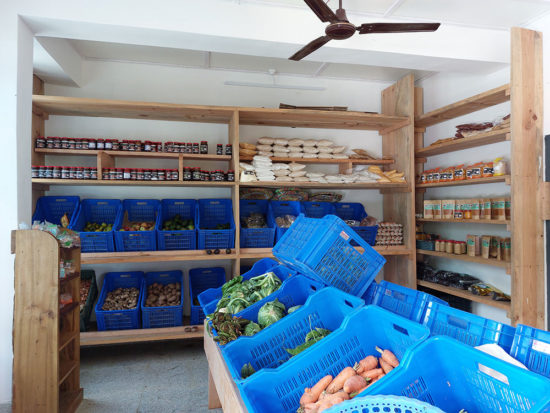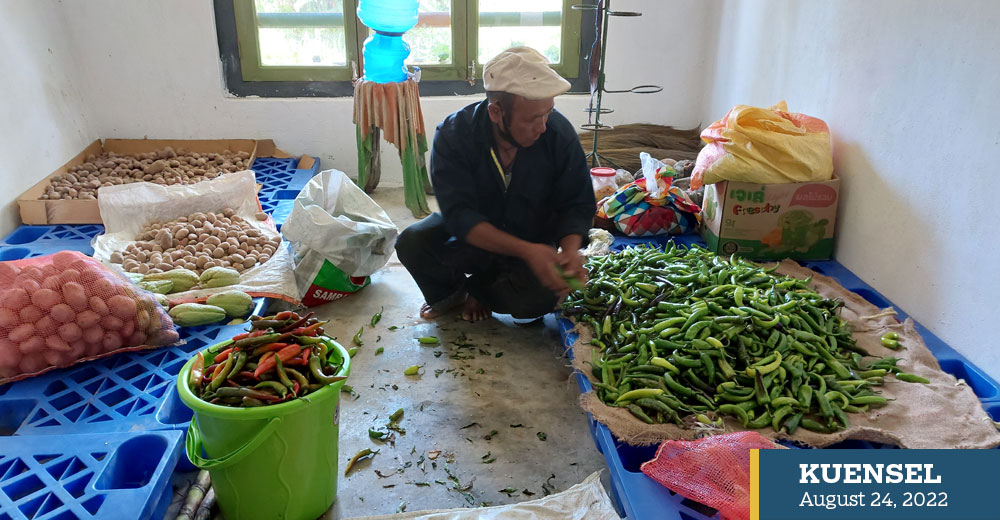Choki Wangmo | Tsirang
Every season, farmers in the country lament as their hard-earned produce rot in the fields. Town residents, meanwhile, look for locally produced vegetables at reasonable rates.
The government agencies have increased agricultural production in recent years through various subsidies and support. However, marketing remains a major challenge facing the Bhutanese farmers.
As Tsirang farmers come together to create a market niche, the issue is expected to be resolved for the producers in the organic capital.
The sales outlet and storage facility located at the dzong and Damphu hospital junction is a go-to place for both residents and farmers in the district.
With the brand name, Tsirang Natural, the sales outlet run by a 17-member farmer’s group from Dunglangang, boasts of 50 naturally grown vegetables and farm products on their shelves.

Storage facility at the sales outlet
It almost seems like a local convenience store—avocados, chilli paste, pickles, packaged seeds, dairy products, grains, vermicompost and recycled mats, among others.
While most of the products are procured from Drongsep Yargey Detshen in Dunglagang, farmers’ groups across the district are gradually reaching out to the outlet.
“The group grows produce on the 10 acres of leased land in Dunglagang but we want to link with farmers in gewogs, even on a small scale,” said the manager, Deo Kumar Rai.
Three farmers’ groups have already started selling their products at the store.
The two-storey building is a busy place in Damphu. Every day, 600 customers visit the outlet.
The group also runs a cafe in the same building. The ground floor is used as a storage facility. Eight youth are currently employed in the storage. They segregate and grade the produce.
The storage has a capacity of storing about 40 tonnes of produce. With a minimal fee, other farmers’ groups can avail the storage services.
The outlet is a self-sustaining system. Farm produce is displayed on shelves for two days after which they are removed. Some are pickled and dried.
“We are embracing the zero-waste policy,” said Deo Kumar, a former engineer.
Deo Kumar’s wife, Jyoti Rai, runs a coffee shop. Skilled in pickling, packaging, and chips making, she is quick and efficient. She trains and guides some of the younger people in pickling. “We fall behind in services as most of the employees do not have experience.”
The duo is passionate. “As we grew up in the villages, we love what we do,” said Deo Kumar.
Jyoti said that they are working towards linking with more farmers. “In the future, we hope to employ more young people.”
Gopi Sherpa from Padtshaling sells vermicompost. Her products are on display at the sales outlet. She said that the outlet would help in marketing the products.
A member from an organic seed producer group from Thakhorling said that in the past, they sold seeds in the villages. With the help of the outlet, their market outreach has increased.
“We hope to produce on a large-scale. We have a market within and outside the district now,” she said.
The chairperson of Drongsep Yargey Detsen, Amir Rai, said: “In the next six months, we plan to sell produce to other districts. Hopefully, in a few years from now, we can open a sales outlet in Thimphu and employ more youth.”
There are plans to procure marketing vans.
He said that the group is focused on promoting share price to prevent erratic prices of farm produce in the market. Currently, both consumers and producers are vulnerable to drastic price changes in the market, he added.
Constructed at the cost of Nu 4.1 million, the sales outlet was completed last year.
Every year, Tsirang produces about four hundred truckloads of mixed vegetables and about three hundred truckloads of fruits.


